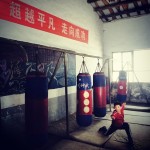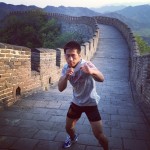Last Wednesday two men, father and son, defended their home from bandits trying to break the door down and force-evict their family. All we saw in the video that went viral over the weekend were several men lying in the foyer of a concrete shell – your typical Chinese home in the countryside – and some thugs outside of the home making calls to their boss. The person with the camera, most likely the man’s wife, also added text to the video letting viewers know the situation and calling for help.
Later the Telegraph interviewed the man, Shen Jianzhong, who told a familiar story for Chinese in this era of relentless urbanization:
“They called it a remodelling project, to turn our village into a town,” he said. “They wanted to tear down the whole street, and promised we would get a new house of the same size in two years, as well as rent to cover the interim. But I heard of people in a neighbouring village getting a much better deal, so we refused to sign.”
“This mob of thugs would block the street most days. They would pick on the women, threatening to kill their kids. Then people started tossing bricks through windows and letting off fireworks at night. Some people got beaten on the street.”
On October 29, as Mr Shen went to work and his wife popped out for a packet of instant noodles, a mob of “30 to 50 men” materialised at their front door.
“My wife tried to close the door, but they pushed it back and she tripped over. That is how the fight started,” said Mr Shen.
Shen then took off for Beijing with his family, only to have his son arrested by the same authorities that couldn’t protect him when thugs tried to force him and his family to leave their home. The Telegraph story ends with a cliffhanger: a supposedly sympathetic official contacting Shen and telling him to wait to get picked up by a car.
Righteous Fists
Asian history is filled with tales of martial arts heroes defending the weak from predatory bandits, corrupt officials and ruthless gangsters. From the Romance of the Three Kingdoms to Kill Bill, the story remains familiar: an unlikely hero/heroine takes on seemingly insurmountable odds with a combination of face-popping combat skills and a righteous cause. Sometimes the story ends well and sometimes not. But the characters are the same because society, for all its gadgets and achievements, often remains the same.
Few societies on earth display this level of continuity as strongly as China. Despite a century of upheaval, we consistently see the same predatory figures and the same lone heroes that Chinese artists have sung about for centuries. I mean really, how classic is the tale of Shen Jianzhong? On one hand we have a gang of thugs, a greedy developer, and a corrupt government and on the other we have a simple man who loves kung fu and his son, who loves his father. Then, as if scripted by the great martial art bard himself, Jin Yong, the thugs make a move and get beat up by the simple hero in the first scene, and the government strikes back in the second … we can only hope that Act Three brings the climax we’re all hoping for.
If this scenario can play out today, then surely kung fu is just as relevant in modern China as it was in the days of swords and pikes. But it’s clear by now that classic, traditional kung fu is dying in Mainland China, or being replaced with performance arts and competitive boxing. We know that many styles have been lost and many masters face a future without students, but how many Shen Jianzhong’s are there in China? How many “crouching tigers” are there in China that study kung fu on their own, practice with their sons, and keep in shape just for the love of it? In my 12 years in China I have met dozens of men who have trained a bit of martial arts and no one would ever know it unless … thugs came to evict the man’s family.
It’s like a relaxed version of martial arts during the Cultural Revolution: back then people still trained and taught, but they had to do so in the middle of the night, or in secret places far from prying eyes and flapping tongues. Today the same respect and dedication exists in China, no matter how many masters die without passing on their arts, and that is a sign of hope for kung fu scholars and enthusiasts.
The Telegraph described him as “an amateur fan of kung fu,” which may be a disservice, but also hints at a truth that is plaguing the development and survival of Chinese martial arts. Men like Shen may not have a master, they may not even have an idea of what their “style” is, yet they have the dedication to train every day and, in Shen’s case, even shoot for world records. Are there any masters left in Shen’s region? Why wasn’t he studying with them? What did he employ to beat up those punks? In the article he admits that he “doesn’t even remember what kung fu skills he used” to win the fight.
But he won. Against great odds.
It’s almost as if fate placed Shen Jianzhong in the limelight to remind Chinese that righteous fists are needed in this lawless society; more than ever before, China needs heroes to look up to.
Re-discovering the soul of Bruce Lee
The Telegraph also mentions that Shen’s hero is Bruce Lee, which says a lot about the state of kung fu in China. Shen didn’t mention his master or a certain school he was affiliated with, but a movie star who created his own method of fighting by combining various his experience with styles and his ideas concerning combat into Jeet Kun Do. Bruce Lee exemplifies rebellion against traditional authority within the martial arts – he disdained traditional styles as “useless” and “baloney” and urged people to express themselves through martial arts: kick when you nmeed to kick, punch when you need to punch, be in the moment … hence the title of his book, The Tao of Jeet Kun Do, which emphasizes the Taoist element of living in the moment and finding the Way.
Traditionalists of course are not fond of being called useless, but Shen Jianzhong’s hero is not just the hero of the rebellious amateur. Many masters I have spoken to revere and respect Bruce Lee. A long-awaited reconciliation between the rebel and his teachers may be the key to the revival of traditional styles on the Mainland …
People around the world look up to Bruce Lee as a paragon of martial arts prowess. Powerful, righteous, patriotic, humble. These are the traits that kung fu promotes and ingrains into individuals and every character that Lee played in his films displayed these classic characteristics of the righteous martial arts hero.
Does Shen realize that his hero was a rebel that defied authority with his every breath? He left China for Hong Kong, fought and rejected prominent masters of his era, threw away the dogma of the past, and created a path of his own that others follow to this day.
China needs another Bruce Lee. Someone to revive the classic ideas of what is good and righteous and embody them fearlessly in the face of power. Shen Jianzhong may be just a precursor, or, more likely, a flash in the pan soon to be swallowed up by China’s inexorable slouch toward Gomorrah. But the fact that he even exists should give people who love kung fu, love China, and love the good and beautiful things this country once stood for a bit of hope.






Great thoughts as always. I found that same incident to be very suggestive of the sorts of community violence that have traditionally happened in China and how hand combat training was an effective strategy for dealing with them. I agree that it is remarkable that Lee has developed such a strong following on the mainland.
Yeah I remember reading an account of pre-Liberation China in which chasing off bandits was a weekly thing. Explains the architecture here as well. Led to me to start thinking of gov’t manipulation of martial arts ie promoting when needed (as deterrent, border control, militia) and crushing when not desirbale to have an armed populace (turbulent times, power transitions, peace-time)…
[…] hope one of them does what this guy did in China, and perhaps instead of persecuting the martial artist, the authorities in India can help […]